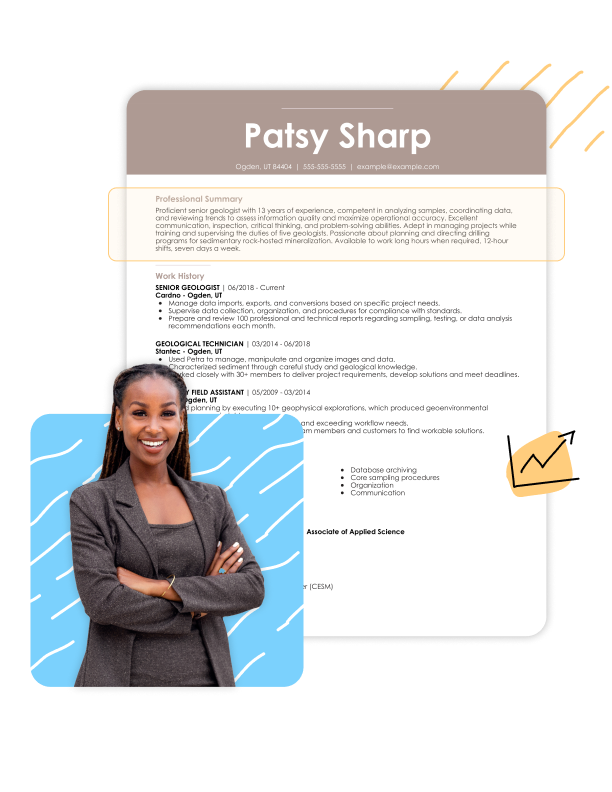Getting the attention of hiring managers with a resume summary is a key step to writing an effective resume.
In just a few short sentences, you want them to clearly understand why you are a candidate worthy of further consideration.
In this guide we’ll help you:
- Understand how to write a resume summary.
- Determine when to use a summary.
- Make your summary compelling.
- Leverage resume summary examples for various levels of experience and jobs.
- Get started with a resume summary template you can use for your own application.
Want us to write your resume summary for you? Our AI Resume Builder generates content for the most challenging sections of your resume, including the summary. You can update your current resume or make one from scratch in just a few clicks!
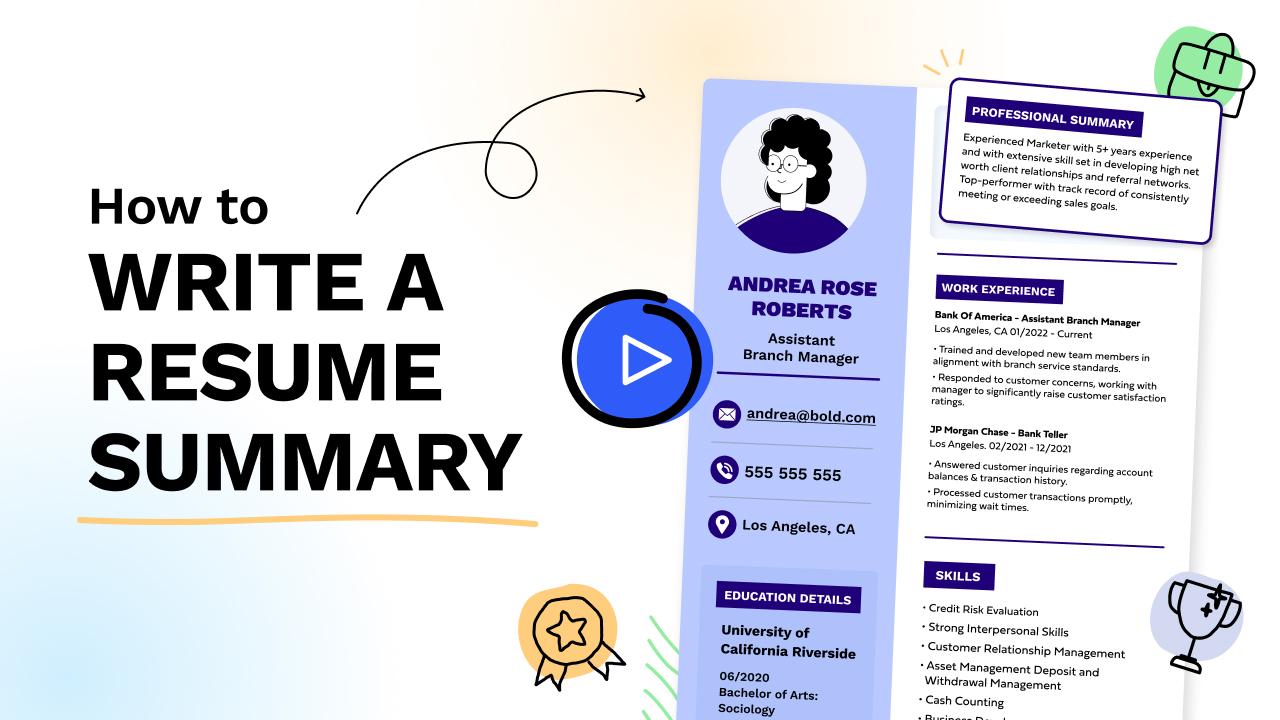
What Is a Resume Summary?
A resume summary, also known as a professional summary, is a brief three- to four-sentence statement placed at the top of your resume that highlights your key qualifications, skills and experience relevant to the job you’re applying for.
As with other resume profiles, a resume summary serves as an introduction that quickly tells employers why you’re a strong candidate, helping you stand out from other applicants.
Think of the resume summary as the teaser trailer for the rest of your resume. You have only a short time to grab the attention of the reader and entice them to learn more about you.
Plus, a resume summary provides you another opportunity to add keywords that can get picked up by applicant tracking systems (ATS). Making your resume ATS-friendly is crucial as more hiring managers rely on automated technology to filter and pass through the most qualified candidates.
When to use a resume summary
You should use a resume summary if:
- You have relevant experience and skills for the job.
- You are making a career change to a new industry.
- You’re applying to roles where the qualifications match well with your background.
If you don’t have much relevant experience yet or you’ve recently graduated, you may want to consider a resume objective, which focuses on what you’re hoping to accomplish in a role instead.
Since a summary focuses on how your unique expertise makes you a valuable candidate, it helps employers quickly understand your qualifications and suitability for the role, saving them time and grabbing their attention early on.
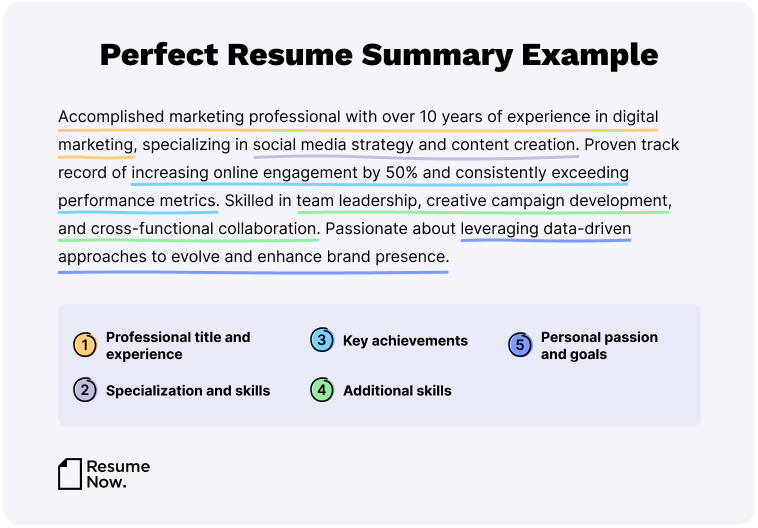
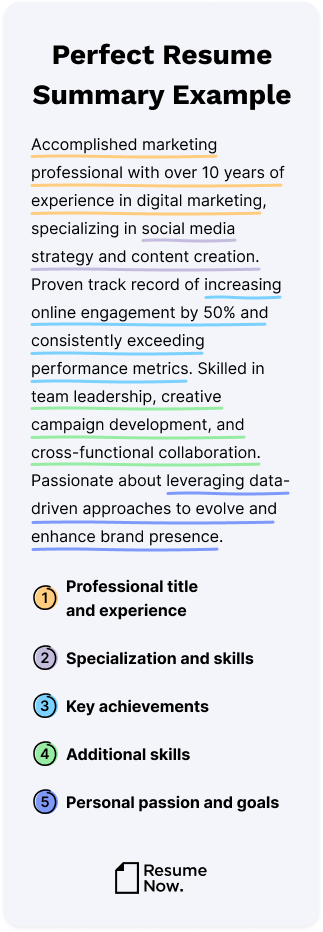
How to Write a Resume Summary
Writing a resume summary is quite straightforward. As long as you are showcasing your best relevant qualifications in a few short sentences, you’re on the right track.
However, consider the following steps to make sure you have a professional summary that gets noticed:
- Begin with your key skills: Focus on skills found in the job description and highlight what makes you stand out.
- Mention your top accomplishments: Include measurable achievements that demonstrate your value.
- Tailor your summary: Integrate keywords from the job description to show the ATS and hiring managers that you’re qualified.
- Be concise: Summarize your strengths in three to four sentences to avoid overwhelming the hiring manager.
Want us to write you a professional quality resume summary? With our AI Resume Summary Generator, you can get what you need in a matter of minutes. Upload your resume and our generator will put together a customizable summary that highlights your best qualifications.
Resume summary template
With those steps in mind, use this template to help you write your resume summary. Just fill in the details to meet your specific circumstances.
[Your job title] with [number of years] of experience in [key industry or field]. Proven track record of [achievement or accomplishment], with expertise in [relevant skills/tools]. Adept at [specific job function or task] to support company goals and drive success. Looking to bring my [unique strength or experience] to [target role/company name].
Here is an example of a resume summary based on the template:
Marketing manager with over five years of experience in digital marketing. Proven track record of increasing web traffic by 40% through SEO and social media strategies. Adept at managing multichannel campaigns to support business growth. Looking to bring creative problem-solving and leadership skills to ABC Company.
Professional Resume Summary Examples
Check out the following resume summary examples for some of the most common situations found when applying for jobs. Each one could be for a situation you might find yourself in!
Entry-level resume summary
Recent marketing graduate with a 4.0 GPA and experience in digital marketing internships. Skilled in SEO, social media management and content creation, including developing 15 campus marketing campaigns that increased student engagement by 20%. Eager to contribute to improving metrics and conversions at an innovative marketing team.
This is a good example of a resume summary because it:
- Highlights relevant skills for someone with limited experience.
- Focuses on academic achievements and internships.
- Demonstrates readiness for the workforce.
Career change resume summary
Experienced teacher transitioning to project management with expertise in communication, team leadership and scheduling. Skilled in managing complex tasks and collaborating with diverse teams for projects involving over 100 people, including monthly reports to state administrators.
This makes for a good resume summary example because it:
- Emphasizes transferable skills.
- Shows adaptability and willingness to change industries.
- Directly expresses that they’re making a career shift.
Experienced professional summary
Operations manager with 10+ years of experience overseeing logistics and supply chain management. Proven track record of reducing costs by 20% and improving efficiency in manufacturing. Excited to bring excellent organizational, leadership and time management skills to ABC Corp.
This resume summary is a great example because it:
- Demonstrates leadership and a strong track record.
- Highlights years of experience and relevant accomplishments.
- Shows a clear impact on previous roles.
Technical professional summary
IT specialist with over five years of experience in network administration, cloud computing and cybersecurity. Certified in AWS and CompTIA Security+, with expertise in troubleshooting and systems optimization. Achieved a migration of 100K users into a new CRM with minimal downtime and 100% accuracy.
Here is a resume summary sample that works well because it:
- Focuses on technical skills and certifications.
- Targets a specialized field with relevant expertise.
- Highlights key tools and technologies.
Soft skills-focused resume summary
Customer service representative with strong communication and problem-solving skills. Proven ability to handle high-stress situations, resolve customer issues efficiently and improve satisfaction rates by 15%.
This is another effective example of a resume summary because it:
- Emphasizes interpersonal skills.
- Shows direct impact on customer satisfaction.
- Great for customer-facing or team-oriented roles.
Resume summary for students
Driven physical therapy major seeking summer internship. Compassionate with strong interpersonal skills and extensive training in creating treatment plans for clients. Adept at recordkeeping to track client’s progress. Able to work evenings and weekends.
This is a strong resume summary sample because it:
- Highlights desirable soft skills that are relevant to the role.
- Includes a list of relevant hard and soft skills and experience.
- Mentions the ability to accommodate a flexible schedule.
Next, let’s review resume summary examples from specific industries.
Start your resume journey with our expert designed list of templates—browse and get started now.
60+ Resume Summary Examples by Job Type
Having a specific job or industry in mind can be very useful when writing a resume summary. Check out the following examples so you can find one that fits your goals.
Or, for even more help, take a look at our resume examples library.
Accounting resume summary example
Seasoned accounting professional with over eight years of experience in financial analysis, budgeting and auditing. Proven ability in optimizing financial processes and enhancing compliance, contributing significantly to a 20% increase in financial efficiency in previous organizations. Recognized for implementing cost-saving initiatives leading to substantial budget reductions.
See a complete accounting resume.
Administrative assistant resume summary example
Highly organized administrative assistant with over five years of experience in office management and executive support. Skilled in calendar management, client relations and streamlining operations to enhance office efficiency. Proven ability to manage multiple tasks, meet tight deadlines and ensure smooth day-to-day operations in a fast-paced environment.
See a complete administrative assistant resume.
Art summary statement example
Art graduate with a deep understanding of contemporary art, skilled in curatorial practices and gallery management. Proven ability to create engaging exhibitions and maintain strong relationships with artists and the art community, resulting in a 40% increase in gallery attendance. Experienced in organizing high-profile art events and exhibitions.
See a complete art resume.
Banking resume summary example
Customer-focused banking professional adept in financial advisory and relationship management. Consistent record of achieving sales targets and enhancing customer satisfaction in previous banking roles, contributing to a 25% growth in client portfolio. Recognized for outstanding advisory services and deep knowledge of financial products.
See a complete banking resume.
Biotech professional summary example
Biotech professional with five years of experience and expertise in molecular biology, bioinformatics and bioprocess engineering. Proven ability to lead cross-functional teams and manage complex projects. Spearheaded the development of a gene therapy platform that reduced time-to-market by 20%. Skilled in regulatory compliance and driving innovation in therapeutic development.
See a complete biotech resume.
Business resume summary example
MBA graduate with expertise in strategic management, market analysis and project management. Proven track record in developing business strategies that drive growth and efficiency, leading to a 15% increase in profitability for past employers. Skilled in team leadership and cross-functional collaboration, enhancing organizational performance.
See a complete business resume.
Cashier professional summary example
Reliable cashier with a strong background in retail operations and customer service. Proficient in POS systems and known for accuracy and efficiency in high-volume transaction environments, maintaining a 99.8% accuracy rate in transactions. Demonstrated ability in managing customer inquiries and providing prompt resolutions.
See a complete cashier resume.
Clinical research coordinator resume summary example
Detail-oriented clinical research coordinator with over six years of experience managing clinical trials from initiation to close-out. Skilled in protocol development, patient recruitment and regulatory compliance, with a proven track record of maintaining high levels of data accuracy and ensuring adherence to ethical guidelines. Adept at working with cross-functional teams and coordinating with sponsors to drive successful trial outcomes.
See a complete clinical research coordinator resume.
Communications resume summary example
Experienced communications professional with a strong background in media relations and content creation. Proven ability to develop and execute effective communication strategies that enhance brand visibility and media engagement, resulting in a 35% increase in media coverage for previous employers. Skilled in digital communication and public speaking.
See a complete communications resume.
Construction summary statement example
Results-driven construction manager with extensive experience in overseeing large-scale projects. Proficient in budget management, team leadership and ensuring compliance with safety and building regulations, resulting in a 10% reduction in project completion time. Expert in resource allocation and risk management, ensuring high-quality outcomes.
See a complete construction resume.
Consulting resume summary example
Strategically minded MBA graduate with a specialization in consulting. Strong analytical skills and experience in providing innovative solutions to complex business challenges, contributing to a 25% improvement in client business processes. Adept at data-driven decision-making and effective communication with stakeholders.
See a complete consulting resume.
Cook resume summary example
Passionate cook with four years of experience in fast-paced kitchen environments. Skilled in preparing a variety of dishes while maintaining strict food safety standards. Known for efficiency, creativity and the ability to collaborate effectively with kitchen staff. Adept at managing high-volume service while consistently producing high-quality, flavorful meals.
See a complete cook resume.
Customer service professional summary example
Experienced customer service professional with a track record of enhancing customer satisfaction and sales performance. Expertise in team leadership, motivational strategies and delivering high-quality service standards, achieving a 95% customer satisfaction rate in previous roles. Skilled in conflict resolution and customer retention strategies.
See a complete customer service resume.
Cybersecurity resume summary example
Recent graduate with a degree in cybersecurity, enthusiastic about applying expertise in digital security and data protection at a leading technology firm. Dedicated to safeguarding sensitive information and ensuring a secure online environment, backed by a solid foundation in cybersecurity principles and threat mitigation strategies.
See a complete cybersecurity resume.
Data analyst resume summary example
Results-driven data analyst with four years of experience in analyzing large datasets to support business decision-making. Proficient in SQL, Python and Tableau, with a strong background in creating dashboards and reporting tools. Proven ability to uncover actionable insights that drive strategy and improve operational efficiency.
See a complete data analyst resume.
Dentistry resume summary example
Skilled dental assistant with comprehensive experience in patient care, dental procedures and office management. Committed to providing excellent dental services and fostering a comfortable patient environment, resulting in a 90% patient satisfaction rate. Proficient in dental software and patient education.
See a complete dentistry resume.
Electrician summary statement example
Certified electrician with in-depth knowledge of electrical codes and standards. Extensive experience in residential and commercial electrical installations, committed to safety and excellence, maintaining a zero-incident safety record. Known for efficiency and high-quality workmanship in electrical projects.
See a complete electrician resume.
Engineering professional summary example
Accomplished civil engineer with 20+ years of experience in infrastructure development. Expertise in environmental law, risk assessment and project management, contributing to the successful completion of over 30 major infrastructure projects. Skilled in team coordination and project oversight.
See a complete engineering resume.
Executive resume summary example
Seasoned executive with 15+ years of experience in the technology sector. Proven ability in increasing operational efficiency by 30% through innovative process reengineering. Skilled in spearheading innovative projects and guiding high-performing teams to exceed corporate goals, resulting in significant revenue growth.
See a complete executive resume.
Farmer resume summary example
Experienced farmer with 10+ years of hands-on experience in crop production and livestock management. Skilled in sustainable farming practices, soil management and equipment operation. Proven ability to increase crop yields and maintain animal health through effective farm management and efficient resource use.
See a complete farmer resume.
Fraud analyst professional summary example
Aspiring fraud analyst with a strong foundation in data analytics and criminal justice. Proficient in identifying and investigating fraud patterns, aiming to contribute to the security and integrity of financial operations. Demonstrated analytical prowess in detecting a 10% increase in fraudulent activities in previous roles.
See a complete fraud analyst resume.
Government resume summary example
Public administration graduate with internships in government and nonprofit sectors. Eager to apply research skills and policy knowledge in a policy analyst role, contributing to effective governance and public service. Recognized for outstanding policy analysis skills, contributing to a 20% improvement in policy implementation efficiency.
See a complete government resume.
Health care resume summary example
Organized medical receptionist with years of experience in health care administration. Aiming to transition to a medical billing role, bringing expertise in privacy compliance, medical record management and patient care. Proven track record in enhancing patient experience and streamlining administrative processes.
See a complete health care resume.
High school student resume summary example
Motivated high school student with strong academic performance and leadership experience. Proficient in using Microsoft Office and Google Suite, with a passion for technology and problem-solving. Eager to apply organizational and teamwork skills in a part-time role to gain practical experience while contributing to team success.
See a complete high school student resume.
Hospitality resume summary example
Experienced server in fine dining, looking to transition to a hotel concierge role. Deep knowledge of local culture and attractions, with a history of providing exceptional customer service and support, leading to a 35% increase in guest satisfaction. Skilled in event planning and guest relations.
See a complete hospitality resume.
Human resources professional summary example
Human resources coordinator with extensive experience in training, performance management and policy implementation. Seeking a payroll administrator role to apply financial skills and contribute to effective HR operations. Proven success in reducing staff turnover by 25% through effective training and engagement strategies.
See a complete human resources resume.
Information technology resume summary example
IT consultant with years of experience in network and data security. Aiming to leverage in-depth knowledge of company policies and network structure in an IT manager role. Recognized for implementing security measures that reduced system vulnerabilities by 20%.
See a complete information technology resume.
Insurance summary statement example
Insurance professional with expertise in homeowners’ insurance, seeking a claims adjuster position. In-depth knowledge of policy coverage, claim investigation and customer service, resulting in a 98% customer satisfaction rate. Skilled in negotiating settlements and managing complex claims.
See a complete insurance resume.
Internal auditor resume summary example
Analytical finance professional with five years in internal auditing. Expertise in compliance, risk management and financial reporting, aiming to contribute to operational improvements in a senior auditor role. Successfully identified and mitigated risks, leading to a 10% reduction in compliance issues.
See a complete internal auditor resume.
Janitor professional summary example
Dedicated janitor with 10+ years of experience in facility maintenance. Known for efficiency and attention to detail, seeking a position to ensure clean and safe environments. Acknowledged for reducing maintenance costs by 15% through efficient management of resources and supplies.
See a complete janitor resume.
Laboratory technician resume summary example
Skilled laboratory technician with five years of experience conducting tests and experiments in clinical and research environments. Proficient in using specialized lab equipment and maintaining meticulous records to ensure accurate results. Adept at following strict protocols to support research and diagnostic efforts, with a commitment to maintaining high safety and quality standards.
See a complete laboratory technician resume.
Legal resume summary example
Paralegal with five years of experience in the New York State Supreme Court. Expertise in case management, depositions and discovery, aiming to contribute to a growing litigation practice. Proven ability to manage over 100 cases simultaneously, maintaining high accuracy and efficiency.
See a complete legal resume.
Marketing manager resume summary example
Creative and strategic marketing manager with over seven years of experience leading successful campaigns across digital and traditional channels. Skilled in brand management, market research and SEO optimization, with a track record of increasing engagement by 30% and driving revenue growth by 20%. Adept at managing cross-functional teams and aligning marketing strategies with business goals.
See a complete marketing manager resume.
Medical professional summary example
Experienced radiology technician seeking a position in Florida. Proficient in radiological procedures, equipment operation and patient care, with a commitment to excellence in medical services. Recognized for improving patient throughput by 20% through efficient procedure management.
See a complete medical resume.
Medical coding summary statement example
Certified Medical Coder with three years of experience in hospital settings. Proficient in ICD-10 and CPT coding, aiming to ensure accuracy and efficiency in medical billing. Achieved a 98% accuracy rate in code assignments, significantly reducing billing errors.
See a complete medical coding resume.
Mental health counselor resume summary example
Skilled mental health counselor with a master’s in clinical psychology. Expertise in cognitive-behavioral therapy (CBT) and crisis intervention, aiming to support individuals at a wellness center. Contributed to a 40% improvement in patient recovery rates through effective therapy techniques.
See a complete mental health counselor resume.
Microbiology professional summary example
Microbiologist specialized in infectious diseases, seeking an entry-level position. Strong foundation in laboratory research and pathogen study, aiming to contribute to groundbreaking research. Played a key role in a study that led to a 15% advancement in understanding infectious disease mechanisms.
See a complete microbiologist resume.
Military resume summary example
Veteran military professional with 12 years of distinguished service in the U.S. Army, specializing in logistics, team leadership and strategic planning. Proven track record in managing complex operations and leading cross-functional teams, aiming to bring disciplined, organizational skills to a project management role in the civilian sector.
See a complete military resume.
Model resume summary example
Dynamic professional model with three years of experience in fashion and commercial modeling. Versatile and creative, known for a strong work ethic and adaptability to various styles and concepts. Successful in numerous high-profile campaigns, aiming to expand portfolio with major fashion brands and agencies.
See a complete model resume.
Nursing summary statement example
Newly certified nurse, returning to the workforce with practical experience in caregiving. Skills honed in personal care, physical therapy and medication management while attending to a family member. Dedicated to providing compassionate care in a professional health care setting.
See a complete nursing resume.
Personal assistant professional summary example
Experienced personal assistant with over five years of managing business and personal affairs for executives. Enhanced productivity by 40% through exceptional organizational and multitasking skills. Aiming to utilize expertise in a challenging role that demands high-level support and efficient coordination.
See a complete personal assistant resume.
Personal trainer resume summary example
Certified personal trainer with three years of experience helping clients achieve their fitness goals through personalized training plans and nutrition guidance. Skilled in strength training, cardio programs and injury prevention. Passionate about motivating clients and fostering a positive, supportive environment to help them succeed.
See a complete personal trainer resume.
Pharmacy technician resume summary example
Certified Pharmacy Technician with a solid foundation in prescription processing and pharmaceutical calculations. Demonstrated 98% accuracy in medication dispensing, aiming to contribute to the high-efficiency operations of a reputable pharmacy.
See a complete pharmacy technician resume.
Project manager resume summary example
Experienced project manager with over eight years in managing large-scale projects in the tech and finance industries. Proficient in Agile and Waterfall methodologies, with a proven ability to deliver projects on time and within budget. Skilled in stakeholder communication, team leadership and risk management, having successfully led teams to complete a $5 million project two weeks ahead of schedule.
See a complete project manager resume.
Psychology resume summary example
Dedicated psychology graduate with honors, focused on applying knowledge of behavioral therapy and research in practical settings. Keen interest in child and adolescent psychology, aiming to significantly impact therapeutic roles.
See a complete psychology resume.
Public relations professional summary example
Skilled public relations specialist with three years of experience in corporate communication and media relations. Demonstrated ability to increase media coverage by 20% for previous employers, seeking to bring expertise and innovative strategies to a progressive organization.
See a complete public relations resume.
Real estate resume summary example
Dynamic real estate professional with a proven track record of a 95% client satisfaction rate over four years. Expert in property sales and market analysis, eager to contribute to a reputable real estate firm with a focus on client satisfaction and business growth.
See a complete real estate resume.
Restaurant manager resume summary example
Proactive restaurant manager with over eight years of experience in high-volume dining. Improved customer satisfaction by 30% through effective staff training and operational management. Aiming to apply leadership and creative problem-solving in a thriving culinary environment.
See a complete restaurant manager resume.
Sales summary statement example
Senior project manager with 10 years of successful experience at ABC Sales, looking to transition into an account manager role. Highly skilled in detail-oriented tasks, time management and building customer relationships to exceed sales targets.
See a complete sales resume.
Sales associate resume summary example
Customer-focused sales associate with three years of experience in retail environments, excelling in meeting sales targets and improving customer satisfaction. Proven ability to drive sales through upselling and effective product demonstrations, resulting in a 25% increase in department revenue. Strong communication and interpersonal skills, with a commitment to delivering excellent service.
See a complete sales associate resume.
Scrum master professional summary example
Certified Scrum Master with five years in Agile project management, adept at reducing project delivery times by 25%. Seeking to apply skills in facilitating team collaboration and continuous improvement in a tech-focused environment.
See a complete Scrum master resume.
Security supervisor resume summary example
Experienced security supervisor with over seven years of managing security operations for commercial and residential properties. Proven ability to lead teams, conduct risk assessments and implement effective security protocols. Skilled in conflict resolution and emergency response, ensuring the safety and security of personnel and property.
See a complete security supervisor resume.
Skilled trades resume summary example
Skilled tradesman with a decade of experience in electrical and plumbing work. Demonstrated ability to complete projects 20% faster than average, seeking a position that utilizes diverse skills in a reputable organization.
See a complete skilled trades resume.
Social work resume summary example
Compassionate social worker with experience in aiding at-risk youth, returning from a three-year Peace Corps service in the Dominican Republic. Fluent in Spanish and eager to apply new skills and perspectives to social work in residential facilities.
See a complete social work resume.
Software engineer resume summary example
Detail-oriented software engineer with over five years of experience in developing and optimizing software applications. Proficient in Java, Python and C++, with expertise in designing high-performance systems and resolving complex technical issues. Skilled in Agile development practices, with a proven ability to collaborate with cross-functional teams to deliver high-quality code on time.
See a complete software engineer resume.
Teaching professional summary example
Experienced educator with a rich background as a tutor, seeking a teaching role at Jonestown High School. Passionate about fostering academic growth, known for creating personalized learning experiences that engage and inspire students.
See a complete teaching resume.
Tutor resume summary example
Recent English literature graduate with a talent for tutoring and a commitment to creating engaging learning environments. Excellent communication skills and a proficiency in diverse teaching methods, aiming to help students reach their full potential.
See a complete tutor resume.
UX designer summary statement example
Innovative UX designer passionate about enhancing user experiences. Successful track record in redesign projects, achieving a 35% increase in user engagement. Aiming to apply creative design thinking and problem-solving skills in a tech-focused company.
See a complete UX designer resume.
FAQ
You should use a resume summary if you have relevant work experience or transferable skills for the job you’re applying for. It’s especially useful for professionals with several years of experience or those making a career change. A resume objective is better suited for recent graduates or those with limited experience, as it focuses more on your career aspirations.
A resume summary should be three to four sentences long. It needs to be concise but impactful, highlighting your key qualifications, relevant skills and top achievements that align with the job description.
Yes, it’s OK to repeat skills from your resume summary in other areas of your resume, as long as they are requirements from the job description. Doing so helps your resume stand up to the scrutiny of applicant tracking systems (ATS), which scan applications for the most relevant keywords.
A good rule of thumb is to apply two to three times the words that are used frequently or are called out as the most important, essential or must-haves in the job description. But be honest — you will be called upon to use essential skills and knowledge if hired!
For example, if the job requires outstanding planning skills and you know you can prove you have them, then mention you are a planner in your summary statement, but make sure it’s highlighted in your job history section and list it as a skill in your skills section.
It’s best to avoid personal pronouns (e.g., “I,” “me,” “my”) in your resume summary. Instead, write in the third person and focus on your skills and achievements. For example, instead of “I have five years of experience,” you would write “Experienced professional with five years of experience.”
No. Personal branding statements are often placed near a job seeker’s name on their resume. Because they are often used as a tagline or slogan, they are repeated on every resume, in social media profiles and in portfolios. For example, “I streamline processes and increase productivity!”
On the other hand, a personal summary is a type of resume profile used to tell employers what a job applicant’s biggest strengths are, what they can do for an employer and why they are the best candidate for the position. Although like branding statements, they are also used to market a job applicant, they are customized for each job and they are much more detailed.
You should not use a resume summary if you do not have work experience. An objective statement is a better approach for you. If you have some work experience, review our resume summary examples for entry level positions.
A good resume summary includes:
- Your job title or professional identity.
- Years of relevant experience.
- Key skills and areas of expertise.
- Major achievements or results that are relevant to the job you’re applying for.
Yes. When formatting a resume, it’s acceptable to use bullet points in the professional summary for a resume to highlight important skills for quick scanning if it’s a functional or skills-based resume.
For example, a skills-based resume summary for a home health aide would look like this:
- Multitasking: Provide quality daily health care, including blood testing, monitoring, washing and wound care to 10 patients with very different needs.
- Verbal communication: Interface daily with family members and doctors concerning patients’ treatments.
- Compassionate: Stellar customer reviews for the ability to provide emotional comfort to patients.
- Knowledgeable: Stay updated on all new medical tests and procedures.
However, there are other resume formats. Most job applicants will use either a chronological or a combination resume format. These job seekers should use the brief paragraph format because it allows them to address more than just skills.
When you’re writing your resume, the top things to avoid in a summary statement are:
- Personal pronouns, such as “I,” “they” and “she.”
- Long paragraphs
- Repetition
- Unnecessary personal information such as your age, hobbies and gender
- Salary or benefits
- Mistakes
- Generic statements
- Lies
Including job-specific keywords in your resume summary can help ensure your resume passes through ATS filters. Many companies use these systems to screen resumes, so tailoring your summary with relevant keywords from the job description increases your chances of being seen by a human recruiter.
Yes, including quantifiable achievements in your resume summary is a great way to demonstrate your impact. For example, you can mention percentages, dollar amounts or specific outcomes that resulted from your work, such as “Increased sales by 20%” or “Managed a $1 million budget.”
Was this information about How To Write A Resume Summary With 60+ Examples helpful? Let us know!
Conor is a Certified Professional Resume Writer (CPRW) and member of the Professional Association of Resume Writers & Career Coaches dedicated to helping job seekers excel in their careers.
More resources

How to Write a CV: The Ultimate Guide
Here is a complete and comprehensive guide to writing a CV ev...

15 Latest Resume Trends for 2026 + Examples
Learn how these 15 current resume trends for 2026 can help you...
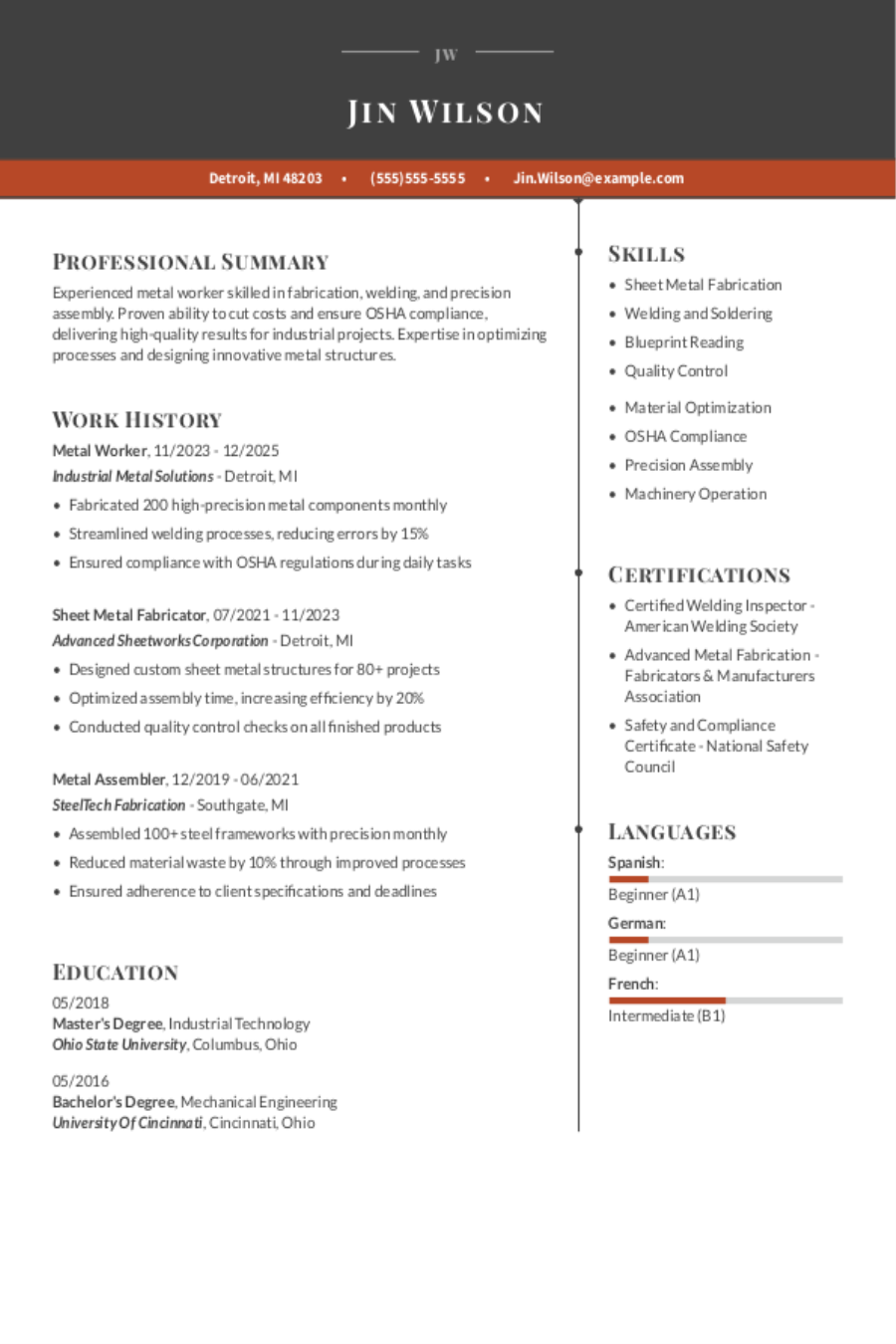
Metal Work Resume: Examples & Templates
As a metal worker you need a resume that showcases your techn...

Maintenance Resume: Examples & Templates
As a maintenance professional you need a resume that showcase...

Mental Health Resume: Examples & Templates
As a mental health professional your resume should highlight ...

